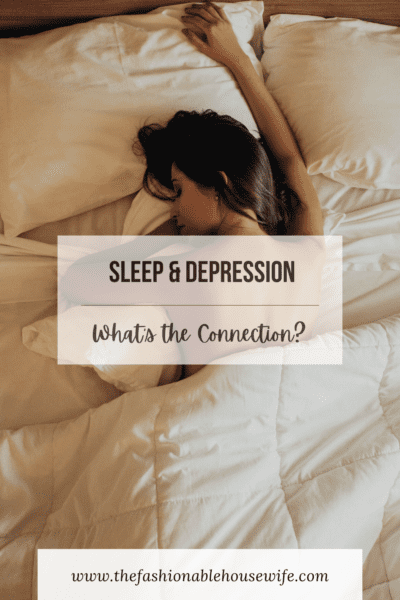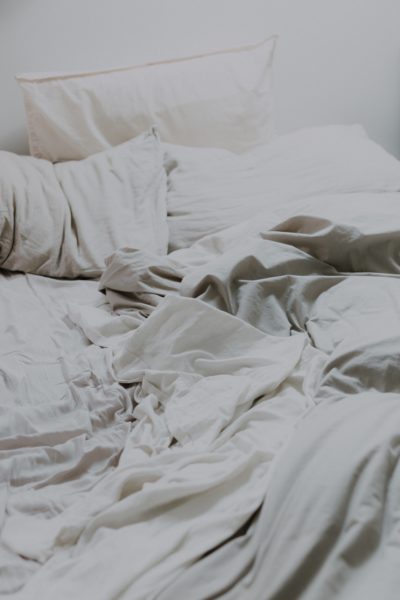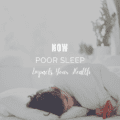
Those who have had any experience with a depressive disorder know that sleep and depression have a tenuous relationship.
You’d imagine that feeling low would allow you to sleep easier, but that’s often not the case. On the flip side, you might have also noticed that depression kept you in bed for too long and forced you to sleep more than you normally would.
We’re going to explore the relationship in this article, giving you some insight into how you might be able to improve your sleep and your symptoms of depression. It’s a complicated issue, and there’s no quick fix but some of the ideas below could provide some help.
Let’s get started.
The Relationship Between Sleep and Depression
We should start out by taking a look at what depression actually is.
All of us feel sad or helpless from time to time. Sadness is a natural emotion that should make an appearance in your life whenever the circumstances warrant it. Sometimes, that sadness lingers for a little longer than we’d like it to, but many people are able to recover and feel themselves after a short amount of time.
Depression, on the other hand, comes in and lingers. It often sticks around for years and manifests itself in different ways throughout a person’s life. Not only does depression cause a person’s general mental state to plummet, but it also comes packed with psychological distress, confusion, and a heavy blow to a person’s self-worth.
The clinical definition of depression states that a person must feel this way for two or more weeks nearly every day and for most of the day in order to have a depressive disorder.
Another thing to keep in mind is that depression isn’t always evident in a person. A person could be clinically depressed and fail to acknowledge it. It makes sense, too, considering nobody wants to be clinically depressed and the reality can be too much to face at times.
Further, there isn’t always a clear answer to why a person is depressed. Depression can be inherited, it can come from serious trauma, or it might grow out of unsatisfactory circumstances.
Where Does Sleep Factor In?

The quality of a person’s sleep has a direct relationship to their mood. The better sleep you get, the more able you are to function and interact with the world in a meaningful way. Some people can run on very little sleep, others cannot.
Sleep doesn’t often cause depression, though. More often, poor sleep over time can cause a person’s life to develop in ways that aren’t ideal. Those factors, along with the fact that the person isn’t resting enough, can generate depressive symptoms and lead to depression.
To make things worse, depression has a clever way of keeping you in bed. Hopelessness, sadness, and lack of energy can keep you lying in the same place for days at a time. Most people tend to nap throughout the day when they’re lying in bed.
Those naps, along with the fact that your body isn’t using much energy, can throw a large wrench in your sleep cycle. Shorter periods of sleep aren’t as restful, and the sleep that you get when the night comes around isn’t as deep.
Psychological Stress and Sleep
It’s also important to remember that those feelings of sadness come along with thoughts to match. Depression can cause a person to question their self-worth, come up with clever explanations as to why they don’t deserve to be happy, and produce a lot of anxiety.
The anxiety that pairs with depression can be debilitating. In a lot of cases, it evolves into a separate anxiety disorder that also has to be addressed.
Everyone has had a night or two that preceded a big meeting or event. When you’re trying to sleep before an important day, the nerves can keep you riled up for hours and limit your sleep. The same idea can apply to those with depression.
Anxious and depressive thoughts can increase your heart rate, keep you awake, and prevent you from sleeping at all.
As you can see, depression attacks a person’s sleep in multiple ways. On one hand, depression can keep you up at night and prevent you from sleeping. The other side forces a person to sleep too much and prevents them from getting restful sleep.
Let’s take a look at some of the ways that a person can try to combat their depression by improving sleep.
Methods of Improving Sleep
Keep in mind that the following methods might be tough to implement if you’re currently experiencing depression.
If you try out some of the ideas below and find that your illness is making it a lot harder than you think it should be, give yourself a little slack. Try to implement one of the ideas once a week and see if you experience any benefit.
Over time, you might find that your sleep improves and you’re better able to add beneficial things into your routine.
1. Get Out Of The Bed

Try to get out of your bed if you’re able. Laying in bed all day is certain to bring on a nap or two.
You don’t have to get out and do anything too ambitious, but just try to spend time in different rooms or explore different activities around the house. If you’re not lying in bed, you’ll be able to get some sleep when you finally lie down.
2. Exercise a Few Hours Before Bedtime
A big piece of depression’s relationship with sleep is that it causes a person to be lethargic.
We’re built to use energy throughout the day, get tired, and rest easier because of it. Even a sedentary lifestyle forces a person to get up and move around here and there to expend some energy. Unfortunately, depression really blocks that process up and leaves you doing almost nothing.
If you can, try to do some pushups or situps a few hours before you go to sleep. Working out right before bed can actually wake you up and cause more problems. A few hours’ time will give your body enough time to work through the endorphins and slow your heart rate.
You’ll be left feeling a little sleepier than normal and you might be able to drift off to sleep.
3. Try Sleep Supplements
Supplements are a great way to reset your circadian rhythms and finally rest easy.

A common supplement is melatonin. Melatonin is a hormone that’s naturally produced in the body when it’s time to go to bed. Typically, this means that your body starts releasing the hormone when it gets dark or a person is entering their normal phase of sleep.
If you’re awake at odd hours and sleeping sporadically throughout the day, odds are that your circadian rhythm is thrown off and you’re not producing proper amounts of melatonin.
Sleep supplements are useful if you’re in that chaotic sleep situation. Take a supplement an hour or so before you want to go to bed, and you’ll be hit with the melatonin and have a much easier time sleeping.
It’s best to use melatonin only as long as you need it to get back into your cycle, though. It might take a week or two for things to so you can get a better night’s rest, but prolonged use can have adverse effects on your hormone production.
4. Consider Counseling
If your depression is keeping you awake at night and you’re not sure what to do about it, counseling could be your best option. Insurance can be a tricky issue when it comes to seeking help.
Fortunately, most communities have some affordable resources for individuals experiencing mental health issues. A nice part of this is that counselors aren’t always better when they’re more expensive.
In fact, those who are looking to help with less compensation might even be more altruistic and interested in helping. Regardless of how you get counseling, it’s an important way to improve your sleep.
The anxious and troublesome thoughts you’re experiencing aren’t permanent. A counselor can explore ways to reduce their intensity and even solve the core issues that are causing them.
Further, your depression might get significantly better with counseling and you’ll start to see improvements throughout your whole life. You could start getting better sleep, managing your thoughts more kindly, and get back on the horse and revisit normal life.
We understand that the options above might not be ideal for you. The important thing to remember is that there are a number of ways to try and ease your depression. It’s a disorder that has effective treatments, and a lot of people have beaten their depression.

Want to Feel Better?
Sleep and depression aren’t the only things holding people back. Life is filled with unexpected turns, feelings, moods, and more. We’re here to help you set yourself up in the best way possible.
If you need ideas on ways to improve your nutrition, health, and happiness, explore our site for the information you’re looking for.






